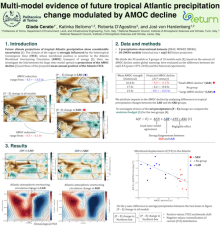Multi-model evidence of future tropical Atlantic precipitation change modulated by AMOC decline
Giada
Cerato
Politecnico di Torino
Poster
Projections from climate models reveal a significant inter-model spread in the anticipated changes in tropical Atlantic rainfall by the end of the 21st century, including alterations to the Intertropical Convergence Zone (ITCZ) and monsoonal regions. While existing studies have identified various sources of uncertainty, our research uncovers, for the first time, a prominent role played by the inter-model spread in the decline of the Atlantic Meridional Overturning Circulation (AMOC). We examine 30 climate model simulations (using the ssp5-8.5 scenario) from the CMIP6 archive and demonstrate that models projecting a more substantial AMOC decline exhibit an equatorward shift of the ascending branch of the Atlantic Hadley-like circulation, resulting in a southward displacement of the ITCZ. Conversely, models projecting a smaller AMOC decline do not indicate any ITCZ displacement. In general, models projecting a stronger AMOC decline also display a stronger AMOC in the mean climate, and are less affected by the double-ITCZ bias in the Atlantic. This reduced bias emerges as a key factor explaining why these models exhibit a more pronounced southward shift of the ITCZ compared to models displaying a relatively weaker decline. Our findings have implications for comprehending the mechanisms driving future changes in tropical Atlantic precipitation and underscore the critical need to refine constraints on the AMOC mean state in climate models, as it significantly influences both the projected changes in AMOC strength and the associated alterations of tropical Atlantic precipitation.

Poster file
cerato-giada-confronting-poster.pdf
(2.88 MB)
